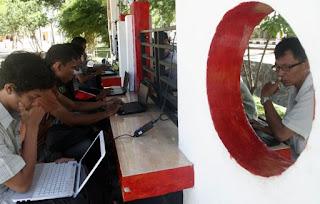Indonesian tech frenzy tantalizes venture capital - Venture capitalists from Silicon Valley in New York have come-from-nothing-tech frenzy all the same question about Indonesia: are the young entrepreneurs who have aroused their interest in intelligent bets, or just surf the hype that will soon burn out.
A few years of Internet connections were so slow in Indonesia who try to download a clip from YouTube could take up to 20 minutes on a good day.
Now is the majority Muslim nation of 240 million people - in spite of the tangled skein of telephone wire, dangle precariously over dusty, bumpy roads - has the world's second-largest number of Facebook users and third is for Twitter.
In addition, an explosion of Web startups is to see popping up with 200 so far this year alone, said Ardianto Natali, owner of the local startup that provides a place for entrepreneurs, developers and potential investors to meet.
Right now, most tech newcomers in Indonesia are not by their creativity. Many of them are clones of established foreign companies such as Craig's List or TripAdvisor or Groupon, with discount coupons and deals.
But with a little care and hope eventually to attract funding and strategy development, venture capitalists and small investors, one day and make some money - Discover help Indonesia in response to Mark Zuckerberg - perhaps, on the road.
"It's still early, and there is not much structure to the ground," said Faisal Sohail, managing director of CMEA Capital, a leading venture capital firms in Silicon Valley, after a whirlwind trip to Indonesia.
"But from a growth perspective, India and China was mainly done in this phase, there are a lot of investors are already there," he said. "So now the question is, what are the markets beyond."
That's partly why I came, "he said," look for some new, world-class entrepreneurs. "
He is willing to invest some money, he said, but personally do not have a fund.
Most of the founders of the new startups are young, recent college graduates to work to scrape together in their living rooms or garages with five fifty-eight people with cash from their parents, friends and professors.
In the majority of cases, the operations are treated as too small to be able to infusions of more than $ 500,000 to $ 2,000,000. And business plans are still fairly rudimentary.
But there are some promising young entrepreneurs, said Sohail and others.
Twenty-six-year-old Eduardus Christmas, hit the scene two years ago, is considered one of the early birds.
Inspired by his literature-loving friend, he began Evolitera, an online publisher offers thousands of free novels, textbooks and scientific papers.
"I saw a need and tried to fill it," said Christmas lights up a cigarette in an outdoor café. "I was really interested in digital publishing."
"Many of the newcomers to the digital media seem to be attracted by the hype, they see how fast things grow and want to jump in," he said. "You have seen that especially in the last year and a half years."
In these days of Christmas is to think more seriously about ways to make money - one of the biggest challenges he and others face, because with only 3 percent of the population have a credit card, there are almost no e-commerce.
There is also little in the way of advertising dollars.
Pulling from his pocket an iPad, Christmas presents one of his recent projects, interactive books, beginning with the classic Indonesian pianist Ananda Sukarlan.
His newest company, Enervolution is a registered Apple developers and allows users to search content for free and then pay for and download music using an iTunes Sukarlan App.
He hopes to develop in this way to a premium market.
At this early stage there were few big successes, especially the forum and classifieds portal Kaskus, which got a $ 100 million commitment from a local investor, and the location-based social network that Yahoo! Koprol recently acquired.
But many others are gaining traction, thanks in large part to the high penetration of BlackBerry, iPhone and other smart phones - have allowed the Indonesians, despite the poor infrastructure in order to shoot directly into cyberspace - some of them knock-offs.
The idea - as in the early days of Silicon Valley - is the first build-to find ways to profit later.
It may be risky, but also Google CEO Eric Schmidt thinks the opportunities are huge.
Next to him at a conference celebrating local entrepreneurship on the resort island of Bali late last month a small group of investors and venture capitalists were interested in promoting tech-hungry youth and also to see what opportunities might not be for them.
They looked at an online football simulation game, football saga, in which members train their players to join teams and compete with other clubs, the set of her friends. You might also like a payment gateway for music, e-commerce and other digital content and a Web-based karaoke website.
"They have 180 million mobile phones, but did you know that you have only about 18 percent Internet penetration?" Said Schmidt. "You're going to have an Internet explosion."

0 komentar:
Posting Komentar